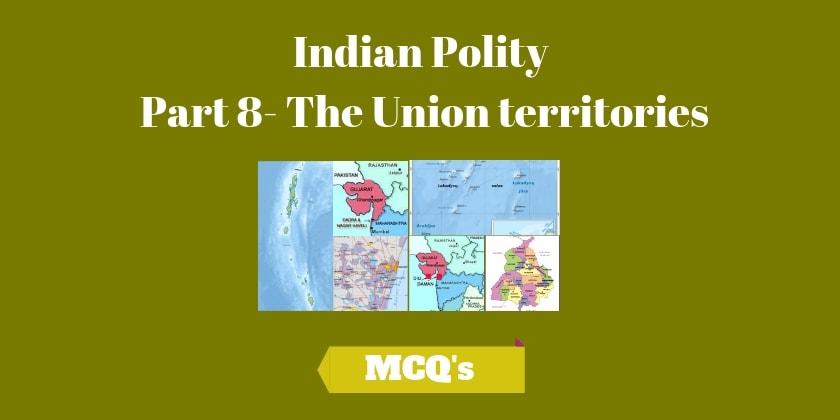Indian Polity: Part 8- The Union Territories-MCQ’s
Part 8 of the Indian Constitution deals with Union territories, in Part 6 we already discuss The States and its Power.
In part 8 we study about Union territories and power of administrator, and topic related quiz which is very helpful for all competitive exams.
What is Union territories?
A Union Territory is a type of administrative division in the Indian Republic.which have their own governments, The Union Territory is directly ruled by the Central Government, hence its name is “Union Territory”.
When the Indian Constitution was adopted in 1949, there was only one union territory: Andaman and Nicobar Islands.
There are seven Union territories are:
1. Chandigarh
2. Dadra and Nagar Haveli
3. Daman and Diu
4. Lakshadweep
5. Puducherry
6. Andaman and Nicobar Islands
7. Delhi
Delhi and Puducherry (Pondicherry) work in a different way than the other five. Delhi and Puducherry were given the status of partial state and Delhi was redefined as the National Capital Region (NCR). Delhi and Puducherry have an elected legislative assembly and an executive council of ministers with partially state-like function. As we study in Indian Constitution Part 6.
Articles under Union Territory are :
1. Article 239: Administration of Union territories.
2. Article 239A: Creation of local Legislatures or Council of Ministers or both for certain Union territories.
3. Article 239AA: Special provisions with respect to Delhi.
4. Article 239AB: Provisions in case of failure of constitutional machinery.
5. Article 239B: Power of administrator to promulgate Ordinances during recess of Legislature.
6. Article 240: Power of President to make regulation for certain Union territories.
7. Article 241: High Courts for Union territories.
8. Article 242: [Repealed.]
Part 8- The Union and It’s Territories-MCQ’s
1. In which of the following union territory a Council of Ministers is elected?
A. Delhi
B. Chandigarh
C. Andaman and Nicobar Islands
D. Daman and Diu
[toggle] Answer – A
Explanation: Delhi and Puducherry are the only two union territories where a Council of Ministers is elected.[/toggle]
2. According to the Constitution of India, the maximum number of members are the Union Territories in the Lok Sabha cannot exceed: [CDS]
A. 10
B. 15
C. 20
D. 25
[toggle] Answer – C[/toggle]
3. Which of the following is true? [CDS]
A. The Chairman and Deputy Chairman, both are not members of Rajya Sabha
B. In the election of President, nominated members of the State Legislative Assembly. do not take part while in the election of Vice-President they take part
C. In the 1992 election of President of India, the members of Union Territories participated for the first time
D. India follows the British convention that the Finance Minister should be a member of Lower House
[toggle] Answer – C[/toggle]
4. Which Union Territories are represented in Rajya Sabha at present?
I. Delhi
II. Puducherry
III. Lakshadweep
IV. Chandigarh
A. I, II and IV
B. II and III
C. I, II, III and IV
D. I and II
[toggle] Answer – D[/toggle]
5. The Union Territories get representation in:
A. Lok Sabha
B. Rajya Sabha
C. both Houses of Parliament
D. None of the above
[toggle] Answer – C[/toggle]
6. Representatives of union Territories in Lok Sabha are chosen by:
A. direct elections
B. indirect elections
C. nomination
D. All the above means
[toggle] Answer – A[/toggle]
7. Union Parliament has the power to legislate on the subjects of all three lists in respect of:
A. Scheduled areas
B. Hill areas
C. Backward areas
D. Union Territories
[toggle] Answer – D
Explanation: 3 lists are-
1. Union List- Union List describes the subjects under the control Centre Government.
2. State List- State List describes the subjects under the jurisdiction of states
3. Concurrent List- Concurrent List describes the subjects which are under the joint jurisdiction of the Centre of States.[/toggle]
8. Which of the following Union Territories can make laws on the concurrent list?
A. Chandigarh
B. Jammu and Kashmir
C. Puducherry
D. Lakshadweep
[toggle] Answer – C[/toggle]
9. Which constitutional amendment envisaged Delhi the status of special state?
A. 91st Amendment
B. 69th Amendment
C. 54th Amendment
D. 73rd Amendment
[toggle] Answer – B
Explanation: the 69th Constitutional Amendment (1991), Delhi has been given the status of a special state.[/toggle]
10. The Chief Minister of Delhi will give his resignation to……
A. The President of India
B. The state’s governor
C. The Deputy Chief Minister of Delhi
D. Delhi Vidhan Sabha Speaker
[toggle] Answer – A[/toggle]

